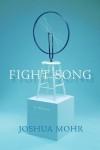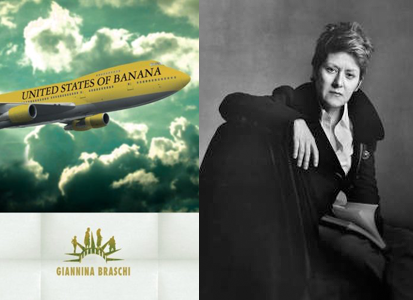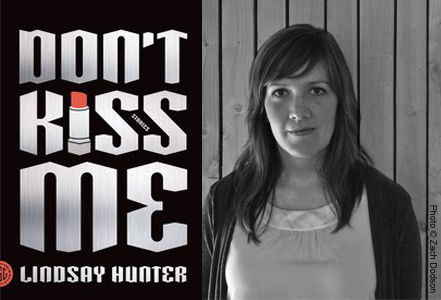


Joshua Mohr is the author of the novels, Termite Parade (a New York Times Book Review Editor’s Choice selection), Some Things That Meant the World to Me (one of O Magazine’s Top 10 reads of 2009 and a San Francisco Chronicle bestseller), and Damascus, published in the fall of 2011 to much critical acclaim. Mohr teaches in the MFA program at the University of San Francisco.
Monkeybicycle: In your self-interview at The Nervous Breakdown, you asked “Is [Fight Song] really a retelling of The Wizard of Oz?” and answered “Loosely. I wanted to set The Wizard of Oz in a 21st century American suburb and see what happens.” What did happen in resettling this story in a 21st century American suburb?
Joshua Mohr: Hopefully, a lot happens. What I was mostly interested in is how narrative morphs, if and when we change the immediate setting the main characters. I have my Dorothy, Bob Coffen, traipsing down his metaphorical yellow brick road. He has his version of all the requisite supporting cast. For example, his tin man is actually a tin woman named Tilda, who runs a phone sex operation through a fast food joint’s intercom system. And there’s magical realism running throughout Fight Song, so both stories exist in a realm in which anything can happen. That was the most fun for me as a storyteller: never feeling bound by the real. Whatever my sick imagination could cook up, it was fair game in Fight Song.
Mb: And while we’ll likely see the apparent Wizard of Oz connections (e.g. the rainbow, the cowardice, the banding together of disparate individuals), what other “loose” elements might we have missed because they are more restrained or understated?
JM: Hmmm. Not sure if I want to decode them all. The quest is the most crucial aspect. Dorothy is literally trying to get back home. Bob Coffen is trying to find his way toward his “home,” his lost sense of self. He’s so personally unhappy that he can’t be a very good husband, a giving father, a thoughtful employee. He’s so stagnant that all he can do is perpetuate that ferocious cycle. He’s let himself go in every definition of the word. Fight Song puts pressure on him to snap out of his haze and take some responsibility for how he’s allowed his world to curdle.
Mb: Fight Song was The TNB Book Club’s February selection. How did this come about, and how does it feel to have such an automatic and dedicated readership guaranteed on the first official day of its release?
JM: The Nervous Breakdown has always been incredibly supportive of my art. I owe them a lot. Brad Listi and Johnny Evison are not only great writers in their own right, they are so generous to other working artists. And I think that it’s to every author’s best interest to be a solid citizen of the indie world, meaning you can’t just take, can’t just self-promote. We have to give back, have to extend ourselves. We’re all in this together, so us indie heads have to help others find an audience, which can be so daunting in a cluttered marketplace.
Mb: One aspect of Fight Song readers may be curious about is your change from Two Dollar Radio, who published your first three novels, to Soft Skull, who published this new novel. Can you talk to us about this change? How did it take place, what does it mean for your future titles, and what do these publishers uniquely offer?
JM: My first 3 novels I did with TDR were a trilogy—all talking about the same geography, the Mission District of San Francisco, and a revolving cast of characters and shared images. In the opening paragraph of the first book “Some Things that Meant the World to Me,” the reader meets a dive bar called Damascus, which ended up being the name and setting of the culminating piece of the cycle. Fight Song is unrelated to the universe and it felt like a turning point, of sorts. So I went with a different publisher for this project. I have no doubt I’ll do another book with TDR in the future. Eric and Eliza Obenauf, who run that shop, are incredible friends of mine. I owe them so much.
In terms of my editorial experiences with both publishers, I have nothing but rave reviews. Both helped me write the best books I’m capable of writing. Both shops seek to bring the best out of the writer. They don’t worry about the marketing department. Their loyalty is to help the author construct the best book. That sounds obvious, but a lot of corporate publishing doesn’t work that way. They steer writers into more safe terrain. TDR and Soft Skull celebrate the subversive, the transgressive.
Mb: The wit and satire present in your works reminds me of Kurt Vonnegut, who, in Palm Sunday, famously graded his own books:
Player Piano (1952): B
The Sirens of Titan (1959): A
Mother Night (1961): A
Cat’s Cradle (1963): A+
God Bless You, Mr. Rosewater (1965): A
Slaughterhouse-Five (1969): A+
Welcome to the Monkey House (1968): B-
Happy Birthday, Wanda June (1971): D
Breakfast of Champions (1973): C
Slapstick (1975): D
Jailbird (1979): A
Palm Sunday (1981): C
How would you grade your current cache of novels?
JM: Keep in mind that I’m a professor, so my red pen is pretty truculent. And I’m only thirty six years old, so I want to believe that my best work is ahead of me. I like the books I’ve written, but I hope they represent the beginning of a long career, one in which I continue to grow and learn. That’s one of the most important things to me and one of the reasons I wrote Fight Song: I want to avoid complacency. In that sense, Bob Coffen’s quest in Fight Song is a cautionary tale. Keep learning! Keep pushing yourself! So in that spirit, here’s how I would grade my first four books:
Some Things that Meant the World to Me (2009): C-
Termite Parade (2010): D+
Damascus (2011): C
Fight Song (2013): C
Hopefully, if I keep pushing myself, I’ll finally write a B- book.
Purchase a copy of Fight Song here, & read more from / about Joshua Mohr here.
J. A. Tyler is the author of nine novel(la)s of poetic fiction. His work has been published in Black Warrior Review, Redivider, Cream City Review, Diagram, Fairy Tale Review, Columbia Poetry Review, and New York Tyrant. He also runs Mud Luscious Press.



